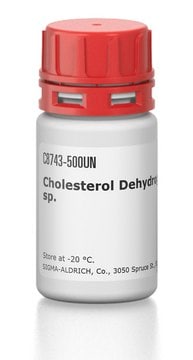G3512
Glycerol Dehydrogenase from Cellulomonas sp.
lyophilized powder, ≥50 units/mg protein
Synonym(s):
Glycerol:NAD+ 2-oxidoreductase
Sign Into View Organizational & Contract Pricing
All Photos(7)
About This Item
EC Number:
MDL number:
UNSPSC Code:
12352204
NACRES:
NA.54
Recommended Products
biological source
bacterial (Cellulomonas spp.)
Quality Level
form
lyophilized powder
specific activity
≥50 units/mg protein
mol wt
~390 kDa
composition
Protein, ≥60% biuret
storage temp.
−20°C
General description
Glycerol Dehydrogenase belongs to iron-containing alcohol dehydrogenase family. It is made up of eight identical subunits which are about 42,000 Da each. The C-terminal has histidine and the N-terminal has serine amino acid.
Application
Glycerol Dehydrogenase (GDH) from Cellulomonas sp. has been used in the determination of glycerol by sequential injection analysis (SIA) method. It has also been used in the preparation of pyrroloquinoline quinone (PQQ) based biosensor for the determination of glycerol.
This enzyme is useful for enzymatic determination of glycerol and of triglyceride when coupled with lipoprotein lipase in clinical analysis. Formation of NADH from the reaction of glycerol and NAD+ was catalyzed by the enzyme glycerol dehydrogenase.
Biochem/physiol Actions
Glycerol dehydrogenase catalyzes the conversion of glycerol to glycerone.
Physical properties
Isoelectric point : 4.4 ± 0.1
Michaelis constants : 1.1 x 10¯2M (Glycerol), 8.9 x 10¯5M (NAD+)
Structure : 10 subunits (42,000) per mol of enzyme
Inhibitors : p-Chloromercuribenzoate, o-phenanthroline, monoiodoacetate, heavy metal
ions (Co++, Ni++, Cu++, Zn++, Cd++)
Optimum pH : 10.0 – 10.5
Optimum temperature : 50°C
pH Stability : pH 7.5 – 10.5 (25°C, 20hr)
Thermal stability : below 55°C (pH 7.5, 15min)
Substrate specificity : This enzyme has the highest specificity for glycerol and 1,2-propanediol, and also oxidizes glycerol-α-monochlorohydrin, ethylene
glycol and 2,3-butanediol. The oxidative reaction is stimulated by K+, NH+4 and Rb+.
Michaelis constants : 1.1 x 10¯2M (Glycerol), 8.9 x 10¯5M (NAD+)
Structure : 10 subunits (42,000) per mol of enzyme
Inhibitors : p-Chloromercuribenzoate, o-phenanthroline, monoiodoacetate, heavy metal
ions (Co++, Ni++, Cu++, Zn++, Cd++)
Optimum pH : 10.0 – 10.5
Optimum temperature : 50°C
pH Stability : pH 7.5 – 10.5 (25°C, 20hr)
Thermal stability : below 55°C (pH 7.5, 15min)
Substrate specificity : This enzyme has the highest specificity for glycerol and 1,2-propanediol, and also oxidizes glycerol-α-monochlorohydrin, ethylene
glycol and 2,3-butanediol. The oxidative reaction is stimulated by K+, NH+4 and Rb+.
Unit Definition
One unit will oxidize 1.0 μmole of glycerol to dihydroxyacetone per min at 25 °C at pH 10.0.
Physical form
Lyophilized powder containing bovine serum albumin
Signal Word
Danger
Hazard Statements
Precautionary Statements
Hazard Classifications
Resp. Sens. 1
Storage Class Code
11 - Combustible Solids
WGK
WGK 3
Flash Point(F)
Not applicable
Flash Point(C)
Not applicable
Personal Protective Equipment
dust mask type N95 (US), Eyeshields, Gloves
Certificates of Analysis (COA)
Search for Certificates of Analysis (COA) by entering the products Lot/Batch Number. Lot and Batch Numbers can be found on a product’s label following the words ‘Lot’ or ‘Batch’.
Already Own This Product?
Find documentation for the products that you have recently purchased in the Document Library.
Customers Also Viewed
An improved glycerol biosensor with an Au-FeS-NAD-glycerol-dehydrogenase anode
Mahadevan A and Fernando S
Biosensors And Bioelectronics, 92, 417-424 (2017)
Sequential injection kinetic flow assay for monitoring glycerol in a sugar fermentation process by Saccharomyces cerevisiae
Dominguez KBH, et al.
Applied Biochemistry and Biotechnology, 160(6), 1664-1673 (2010)
Glycerol dehydrogenase: structure, specificity, and mechanism of a family III polyol dehydrogenase
Ruzheinikov SN, et al.
Structure, 9(9), 789-802 (2001)
Further characterization of glycerol dehydrogenase from Cellulomonas sp. NT3060
Nishise H, et al.
Agricultural and Biological Chemistry, 48(6), 1603-1609 (1984)
Simultaneous detection of ethanol, glucose and glycerol in wines using pyrroloquinoline quinone-dependent dehydrogenases based biosensors
Niculescu M, et al.
Food Chemistry, 82(3), 481-489 (2003)
Protocols
Assay Procedure for Glycerol Dehydrogenase
Our team of scientists has experience in all areas of research including Life Science, Material Science, Chemical Synthesis, Chromatography, Analytical and many others.
Contact Technical Service












